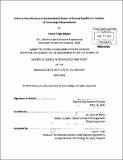End-use electrification in the residential sector : a general equilibrium analysis of technology advancements
Author(s)
Madan, Tanvir Singh
DownloadFull printable version (13.81Mb)
Alternative title
General equilibrium analysis of technology advancements
Other Contributors
Massachusetts Institute of Technology. Technology and Policy Program.
Advisor
John M. Reilly.
Terms of use
Metadata
Show full item recordAbstract
The residential sector in the U.S. is responsible for about 20% of the country's primary energy use (EIA, 2011). Studies estimate that efficiency improvements in this sector can reduce household energy consumption by over 25% by 2020 (McKinsey Global Energy and Materials, 2009). In this thesis, given the increasing amount of attention that both policy-makers and industry are giving to residential energy use, I examine the implications of end-use electrification and efficiency improvements in households. In particular, I focus on high efficiency electric technologies for heating and cooling (referred to as HVAC) needs. Advancements in technologies such as heat pumps are beginning to make the economic case for switching from end-uses of gas to end-uses of electricity in the residential sector. I examine the implications of such end-use electrification, ranging from its impact on energy consumption to its contribution to the abatement of greenhouse gas (GHG) emissions. I use the MIT Emissions Prediction and Policy Analysis (EPPA) model, a computable general equilibrium model, to analyze the research question. The EPPA model captures full economy-wide impacts of policy mandates and technology changes. First, I added further detail to household energy consumption in the model. Then, I introduced technology changes corresponding to advanced electric technologies for residential heating and cooling and tested their impact with policies that either support or inhibit their entry into the marketplace. I find two interesting results from the analysis. First, if policies are enacted to support advanced electric HVAC technologies, they displace end-uses of gas and increase household electricity consumption. Second, household end-use electrification in the U.S. leads to an increase in overall emissions in the economy, given that the overall emissions of any electric appliance depend not only on the end-use efficiency of the appliance but also on the efficiency of generating and distributing electricity. Thus, end use electrification only helps in emissions abatement if the power sector becomes less carbon intensive.
Description
Thesis (S.M. in Technology and Policy)-- Massachusetts Institute of Technology, Engineering Systems Division, Technology and Policy Program, 2012. Cataloged from PDF version of thesis. Includes bibliographical references (p. 59-60).
Date issued
2012Department
Massachusetts Institute of Technology. Engineering Systems Division; Technology and Policy ProgramPublisher
Massachusetts Institute of Technology
Keywords
Engineering Systems Division., Technology and Policy Program.